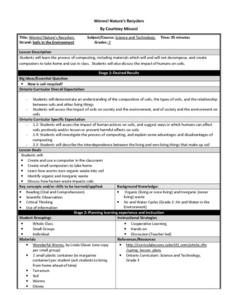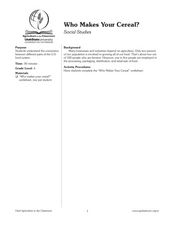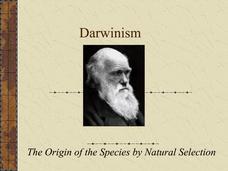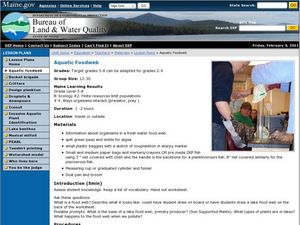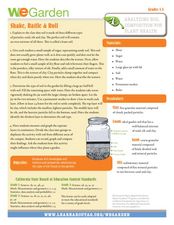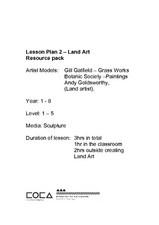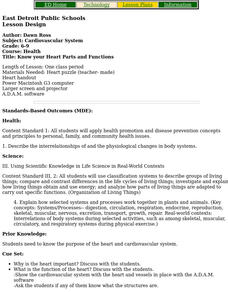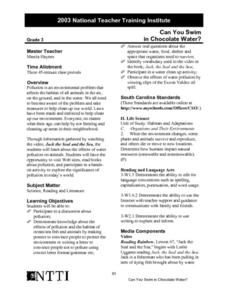Curated OER
Worms, Nature's Recyclers!
Students study what worms need to survive in different environments. They study how worm composting improves soil and reduce waste. They discuss composting techniques and present a puppet show about a worm's life.
Curated OER
The Wonderful World of Slugs
Examine a slug? Of course, what else would a 2nd grader do with it? Pupils use clues and go on a slug hunt, read a slug story, or make a cooperative group mural of a slug's habitat. While older learners catalog slugs, go on a slug hunt,...
Curated OER
Blowing In the Wind
In this wind dispersal activity, students read for information and comprehension. In this short answer and drawing activity, students answer six questions.
Curated OER
Human Genes
In this science activity, students read 10 statements and 1 question about human genes. Students complete the statements and question by filling in the correct word from a list of 11 words.
Curated OER
The Sponges
In this sponge worksheet, students read about the different parts of a sponge and answer 20 short answer questions that follow. They color and label different sponge drawing.
Curated OER
Winter Season
Learners recognize the relationship between Earth's tilt and the Winter season. In this Winter instructional activity, students work in pairs to complete make frost and design snow goggles. Learners experiment a hand lens to study the...
Curated OER
Who Makes Your Cereal?
Fourth graders investigate how cereal is produced. In this agricultural instructional activity, 4th graders discuss where ingredients in cereal come from. Students use picture cards to identify the steps in producing cereal.
Curated OER
Geological Features: How Weathering & Erosion Help Create Landforms
Young scholars explore how the Earth's surface changes resulting in geological features and landforms. They perform a read-a-loud on Thomas
Locker's Mountain Dance, complete a KWL chart, and create a
landform using plaster of paris.
Curated OER
Please the Trees, But Not These, Please!
Students study trees. In this forestry lesson, students complete a variety of activities where they learn the basic parts of a tree and their functions.
Curated OER
Darwinism: The Origin of the Species by Natural Selection.
The Darwin PowerPoint covers many of the Scientists that worked on similar concepts to Darwin and that were involved with famous theories. students are informed about the basic thinking behind natural selection and examples of...
Curated OER
Mammal Characteristics
In this mammal characteristics, students study diagrams to compare the different types of teeth found in herbivores and carnivores. This instructional activity has 1 short answer and 2 multiple choice questions.
Curated OER
Feathers for Lunch Lesson Plan
Students discover different types of birds and the habitats in which the dwell. In this bird lesson, students read Feathers for Lunch, discuss bird facts, and build a bird habitat.
Curated OER
The Wonderful Pigs of Jillian Jiggs
First graders compare fictional and real pigs. In this pig comparison lesson, 1st graders read a fiction text then a non-fiction text on pigs. Students complete a K-W-L chart and fill out a Venn Diagram.
Curated OER
How Do Organisms Vary?
Pupils study variation of organisms. They determine this variation arises from genetic and environmental causes.
Curated OER
"Julie of the Wolves"
Fifth graders research life in Alaska and compare life there to their lives in this lesson. They read "Julie of the Wolves." They research through the novel and other reference books facts about the Alaskan climate and geography. They...
Curated OER
Aquatic Ecosystems
Ninth graders record information on aquatic ecosystems and create a labeled diagram of an ecosystem of their choice. They can choose from an ocean zone, estuary, river, lakes, or beaches. The student has to explain their biome of choice.
Curated OER
Aquatic Foodweb
Learners explore what a food web is. In this science instructional activity, students examine how nutrients and other pollutants enter a lake and play a food web game whereby learners pretend they are either zooplankton, planktivore,...
Curated OER
Shake, Rattle & Roll
Students examine soil. In this science instructional activity, students examine the layers of soil. Students collect soil from various locations and separate the layers. Students record and chart their findings.
Curated OER
Land Art
Students use natural materials outside to create a work of art. In this land art lesson plan, students plan their sculpture inside in one day and create it outside over a period of 2 days.
Curated OER
A Visit to a North Carolina Museum
Students visit the North Carolina Aquariums website and gather the information requested to complete a worksheet. They use this information to write a story about their imaginary trip.
Curated OER
Know your Heart Parts and Functions
Young scholars put together a 3-D interactive "heart" puzzle and learn the names of heart parts.
Curated OER
Can You Swim in Chocolate Water?
Third graders discss water pollution and its affects on animals. They watch a demonstration using a plastic fish in a fish bowl in which various types of water pollution are illustrated.
Curated OER
Classified Information - Part 1: Shapes
Third graders investigate how and why scientists use classification. They discuss classification strategies using animals, and as a class fill in a flowchart with their responses. Next, in small groups they cut out a variety of shapes...
Curated OER
School Yard Park/Ecosystem
Fifth graders observe and categorize different sections of a park and it's ecosystem. For this categorizing lesson plan, 5th graders collect different facets of nature from a nearby park (without disturbing the ecosystem). They map,...


